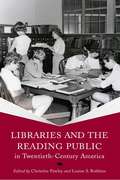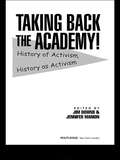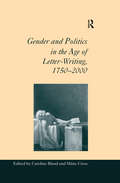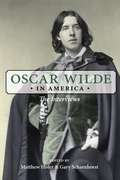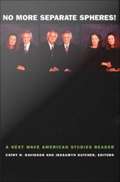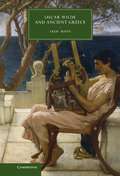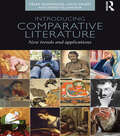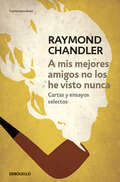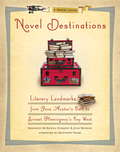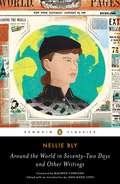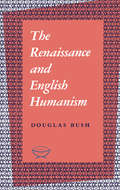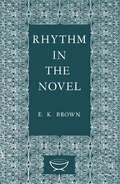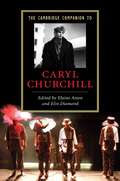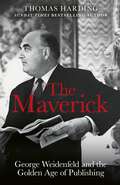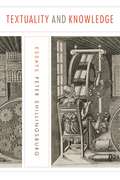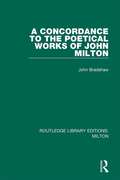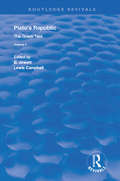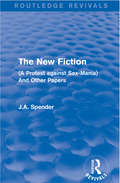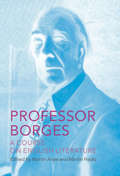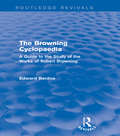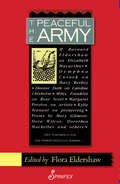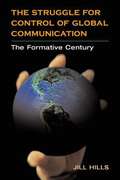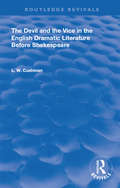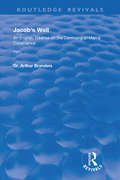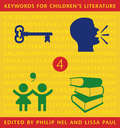- Table View
- List View
Libraries and the Reading Public in Twentieth-Century America
by Christine Pawley Louise S. RobbinsFor well over one hundred years, libraries open to the public have played a crucial part in fostering in Americans the skills and habits of reading and writing, by routinely providing access to standard forms of print: informational genres such as newspapers, pamphlets, textbooks, and other reference books, and literary genres including poetry, plays, and novels. Public libraries continue to have an extraordinary impact; in the early twenty-first century, the American Library Association reports that there are more public library branches than McDonalds restaurants in the United States. Much has been written about libraries from professional and managerial points of view, but less so from the perspectives of those most intimately involved patrons and librarians. Drawing on circulation records, patron reviews, and other archived materials, Libraries and the Reading Public in Twentieth-Century America underscores the evolving roles that libraries have played in the lives of American readers. Each essay in this collection examines a historical circumstance related to reading in libraries. The essays are organized in sections on methods of researching the history of reading in libraries; immigrants and localities; censorship issues; and the role of libraries in providing access to alternative, nonmainstream publications. The volume shows public libraries as living spaces where individuals and groups with diverse backgrounds, needs, and desires encountered and used a great variety of texts, images, and other media throughout the twentieth century.
Taking Back the Academy!: History of Activism, History as Activism
by Jim Downs Jennifer ManionFirst published in 2004. Routledge is an imprint of Taylor & Francis, an informa company.
Gender and Politics in the Age of Letter-Writing, 1750–2000
by Máire CrossLetters have long been an outlet for political expression, whether they articulate the personal politics of the daily routine or the political views of individuals who witness or participate in dramatic events. In addition, letters can be unusually revealing records of the relations between men and women. Though letters have frequently been studied as a privileged space for literary, social, and cultural expression, the three-dimensional relationship of politics, gender, and letters has not been the focus of an entire volume. The nineteen essays in this collection examine how the gendered nature of political literacy is revealed over a 250-year period through letter writing, whether the writer is famous or unknown, the wife of a prominent politician or activist, a political prisoner or political militant. Ranging wide in terms of subject matter and geography, the contributors examine correspondence that ponders familial concerns, as well as letters providing political commentary on the effects of war or revolution on everyday life. Among the impressive group of international scholars are Jim Allen, Clare Brant, Edith Gelles, Jane Rendall, and Siân Reynolds.
Oscar Wilde in America: The Interviews
by Gary Scharnhorst Matthew Hofer Oscar WildeBetter known in 1882 as a cultural icon than a serious writer, Oscar Wilde was brought to North America for a major lecture tour on Aestheticism and the decorative arts. With characteristic aplomb, he adopted the role as the ambassador of Aestheticism, and he tried out a number of phrases, ideas, and strategies that ultimately made him famous as a novelist and playwright. This exceptional volume cites all ninety-one of Wilde's interviews and contains transcripts of forty-eight of them, and it also includes his lecture on his travels in America.
No More Separate Spheres!: A Next Wave American Studies Reader
by Cathy N. Davidson Jessamyn HatcherNo More Separate Spheres! challenges the limitations of thinking about American literature and culture within the narrow rubric of "male public" and "female private" spheres from the founders to the present. With provocative essays by an array of cutting-edge critics with diverse viewpoints, this collection examines the ways that the separate spheres binary has malingered unexamined in feminist criticism, American literary studies, and debates on the public sphere. It exemplifies new ways of analyzing gender, breaks through old paradigms, and offers a primer on feminist thinking for the twenty-first century. Using American literary studies as a way to talk about changing categories of analysis, these essays discuss the work of such major authors as Catharine Sedgwick, Herman Melville, Pauline E. Hopkins, Frederick Douglass, Catharine Beecher, Ralph Waldo Emerson, W. E. B. Du Bois, Sarah Orne Jewett, Nathaniel Hawthorne, María Ampara Ruiz de Burton, Ann Petry, Gwendolyn Brooks, Cynthia Kadohata, Chang Rae-Lee, and Samuel Delany. No More Separate Spheres! shows scholars and students different ways that gender can be approached and incorporated into literary interpretations. Feisty and provocative, it provides a forceful analysis of the limititations of any theory of gender that applies only to women, and urges suspicion of any argument that posits "woman" as a universal or uniform category. By bringing together essays from the influential special issue of American Literature of the same name, a number of classic essays, and several new pieces commissioned for this volume, No More Separate Spheres! will be an ideal teaching tool, providing a key supplementary text in the American literature classroom. Contributors. José F. Aranda, Lauren Berlant, Cathy N. Davidson, Judith Fetterley, Jessamyn Hatcher, Amy Kaplan, Dana D. Nelson, Christopher Newfield, You-me Park, Marjorie Pryse, Elizabeth Renker, Ryan Schneider, Melissa Solomon, Siobhan Somerville, Gayle Wald , Maurice Wallace
Oscar Wilde and Ancient Greece
by Iain RossFrom his boyhood Oscar Wilde was haunted by the literature and culture of ancient Greece, but until now no full-length study has considered in detail the texts, institutions and landscapes through which he imagined Greece. The archaeology of Celtic Ireland, explored by the young Wilde on excavations with his father, informed both his encounter with the archaeology of Greece and his conviction that Celt and Greek shared a hereditary aesthetic sensibility, while major works such as The Picture of Dorian Gray and The Importance of Being Earnest maintain a dynamic, creative relationship with originary texts such as Aristotle's Ethics, Plato's dialogues and the then lost comedies of Menander. Drawing on unpublished archival material, Oscar Wilde and Ancient Greece offers a new portrait of a writer whose work embodies both the late-nineteenth-century conflict between literary and material antiquity and his own contradictory impulses towards Hellenist form and the formlessness of desire.
Introducing Comparative Literature: New Trends and Applications
by Haun Saussy César Domínguez Darío VillanuevaIntroducing Comparative Literature is a comprehensive guide to the field offering clear, concise information alongside useful analysis and examples. It frames the introduction within recent theoretical debates and shifts in the discipline whilst also addressing the history of the field and its practical application. Looking at Comparative Literature within the context of globalization, cosmopolitanism and post or transnationalism, the book also offers engagement and comparison with other visual media such as cinema and e-literature. The first four chapters address the broad theoretical issues within the field such as 'interliterary theory', decoloniality, and world literature, while the next four are more applied, looking at themes, translation, literary history and comparison with other arts. This engaging guide also contains a glossary of terms and concepts as well as a detailed guide to further reading.
A mis mejores amigos no los he visto nunca: Cartas y ensayos selectos
by Raymond ChandlerUn viaje excepcional al mundo de Chandler, marcado por la genialidad, el alcoholismo, la soledad y la visión crítica de la industria del cine. Una lectura fundamental para los fans del género. A mis mejores amigos no los he visto nunca recoge una amplísima selección de la correspondencia y la obra periodística de Raymond Chandler, y constituye como tal un volumen inédito. Aquí se desvelan sus reflexiones literarias, que se caracterizan por un gran sentido del humor, los secretos de su personalidad siempre al borde del abismo, su intuición artística, su curiosidad intelectual y su tormentosa relación con Hollywood. La primera parte del libro es una antología de sus cartas a amigos, editores, agentes y colegas que se lee como una fascinante biografía. La segunda parte consiste en una decena de artículos escritos para la prensa -varios nunca antes traducidos- , que retratan su cambiante visión del mundo a lo largo de los años. Reseña:La obra de Chandler me parece tan imprescindible literariamente como pueda serlo la de Hemingway o Scott Fitzgerald.»Manuel Vázquez Montalbán
Novel Destinations: Literary Landmarks From Jane Austen's Bath to Ernest Hemingway's Key West
by Mckenna Schmidt ShannonPeppered with great reading suggestions and little-known tales of literary gossip, Novel Destinations is a unique travel guide, an attractive gift book, and the ultimate browser's delight.
Around the World in Seventy-Two Days and Other Writings
by Nellie BlyA collection of the articles and writings of famed American journalist Nellie Bly. .
The Renaissance and English Humanism
by Douglas BushThe appearance of a fourth printing of The Renaissance and English Humanism indicated the scholarly success this book has enjoyed for more than a decade. As a brief yet thoughtful and eloquent evaluation of the influence of the Christian humanistic tradition upon our culture it has not been surpassed. The study is divided into four parts: in the first, Professor Bush discusses modern theories of the Renaissance; in the second and third, the character of classical humanism on the Continent and in England; and in the fourth, the place of Milton in the humanistic tradition."Douglas Bush has shown an unusual awareness," wrote Wallace K. Ferguson, "of the historiographical evolution of the Renaissance, and has taken his stand with rare explicitness on the side of those who find the Renaissance filled with mediaeval traditions." Professor Bush sees the dominant ideal of the English Renaissance as rational and religious order, rather than rebellious individualism, and his view has provided an important clue to the English literature and thought of the 16th and the earlier 17th century.
Rhythm in the Novel
by E. K. BrownThe Alexander Lectures for 1949-50. In his Preface, Professor Brown says, "Isolating a single element or group of elements in the novel, and considering it in unreal separation from all the other elements which it actually fuses, is artificial, but so is all criticism. The artificiality is justified if when one turns back from the criticism to the novels these appear more intelligible and more delightful. That is the test." Applying the test to Dr. Brown's present work, the method is more than justified by the results. they are titled: "Phrase, Character, Incident," "Expanding Symbols," "Interweaving Themes," and "Rhythm in E.M. Forster's A Passage to India."
The Cambridge Companion to Caryl Churchill
by Elaine Aston Elin DiamondCaryl Churchill's plays are internationally performed, studied and acclaimed by practitioners, theatre scholars, critics and audiences alike. With fierce imagination the plays dramatise the anxieties and terrors of contemporary life. This Companion presents new scholarship on Churchill's extraordinary and ground-breaking work. Chapters explore a cluster of major plays in relation to pressing social topics - ecological crisis, sexual politics, revolution, terror and selfhood - providing close readings of texts in their theatrical, theoretical and historical contexts. These topic-based essays are intercalated with other essays that delve into Churchill's major collaborations, her performance innovations and her influences on a new generation of playwrights. Contributors explore Churchill's career-long experimentation - her risk-taking that has reinvigorated the stage, both formally and politically. Providing a new critical platform for the study of a theatrical career that spans almost fifty years, the Companion pays fresh attention to Churchill's poetic precision, dark wit and inexhaustible creativity.
The Maverick: George Weidenfeld and the Golden Age of Publishing
by Thomas HardingBorn into a Jewish family in Vienna in 1919, George Weidenfeld fled to England in 1938 to escape the Nazi regime. There he began a career in publishing that would make him one of the most influential figures in the industry. Over the course of his long and illustrious career he championed some of the most important voices of the twentieth century, from Vladimir Nabokov, Mary McCarthy and Saul Bellow to Harold Wilson, Isaiah Berlin and Henry Kissinger.But what do we know about the man himself? Was he, as described by some, the 'greatest salesperson', 'the world's best networker', 'the publisher's publisher' and 'a great intellectual'? Was his lifelong effort to be the world's most famous host a cover for his desperate loneliness? Who, in fact, was the real George Weidenfeld and how did he rise so successfully within the ranks of London and New York society? Providing a full, unvarnished and at times difficult history of this complex man, this first biography of a titan of culture is also a story of resilience, determination and the power of ideas to shape history.
Textuality and Knowledge: Essays (Penn State Series in the History of the Book)
by Peter ShillingsburgIn literary investigation all evidence is textual, dependent on preservation in material copies. Copies, however, are vulnerable to inadvertent and purposeful change. In this volume, Peter Shillingsburg explores the implications of this central concept of textual scholarship.Through thirteen essays, Shillingsburg argues that literary study depends on documents, the preservation of works, and textual replication, and he traces how this proposition affects understanding. He explains the consequences of textual knowledge (and ignorance) in teaching, reading, and research—and in the generous impulses behind the digitization of cultural documents. He also examines the ways in which facile assumptions about a text can lead one astray, discusses how differing international and cultural understandings of the importance of documents and their preservation shape both knowledge about and replication of works, and assesses the dissemination of information in the context of ethics and social justice. In bringing these wide-ranging pieces together, Shillingsburg reveals how and why meaning changes with each successive rendering of a work, the value in viewing each subsequent copy of a text as an original entity, and the relationship between textuality and knowledge.Featuring case studies throughout, this erudite collection distills decades of Shillingsburg’s thought on literary history and criticism and appraises the place of textual studies and scholarly editing today.
A Concordance to the Poetical Works of John Milton (Routledge Library Editions: Milton #3)
by John BradshawFirst published in 1894. This Concordance to the Poetical Works of John Milton includes all of Milton’s poems, excluding the Psalms and the Translations in the prose works; and all of the words are given with the exception of some of the pronouns, conjunctions, adverbs and prepositions; but any of these used peculiarly are given. It is hoped that the work will be found useful not only by the student of Milton but by the grammarian and the philologist.
Plato's Republic: The Greek Text (Routledge Revivals)
by B. JOWETT AND LEWIS CAMPBELLFirst published in 1894, this book consists of essays by professors Jowett and Campbell about the classic Greek philosopher Plato, and his famous and widely read dialogue The Republic, which is considered one the world’s most influential works. Plato is believed to be the pivotal figure in the development of Western philosophy, and the editors explore this throughout the book along with relations to other Greek dialogues and authors.
The New Fiction: (A Protest against Sex-Mania) And Other Papers (Routledge Revivals)
by J.A. SpenderThis collection of essays attempts to analyse common assumptions about art, literature and criticism at the time of publication in 1895. Taking the position of ‘a Philistine’ , Spender argues against the ‘new’ art and fiction and encourages the average member of the public to state their opinion and give validation that the average view is just as worthy as the ‘new’ criticism which tended toward superiority. This title will be of interest to students of Literature, Art and Art History.
Professor Borges: A Course on English Literature
by Jorge Luis Borges Katherine Silver Martín Hadis Martín AriasIn English at last, Borges's erudite and entertaining lectures on English literature from Beowulf to Oscar Wilde Writing for Harper's Magazine, Edgardo Krebs describes Professor Borges:"A compilation of the twenty-five lectures Borges gave in 1966 at the University of Buenos Aires, where he taught English literature. Starting with the Vikings' kennings and Beowulf and ending with Stevenson and Oscar Wilde, the book traverses a landscape of 'precursors,'cross-cultural borrowings, and genres of expression, all connected by Borges into a vast interpretive web. This is the most surprising and useful of Borges's works to have appeared posthumously." Borges takes us on a startling, idiosyncratic, fresh, and highly opinionated tour of English literature, weaving together countless cultural traditions of the last three thousand years. Borges's lectures -- delivered extempore by a man of extraordinary erudition -- bring the canon to remarkably vivid life. Now translated into English for the first time, these lectures are accompanied by extensive and informative notes by the Borges scholars Martín Arias and Martín Hadis.
The Browning Cyclopaedia: A Guide to the Study of the Works of Robert Browning (Routledge Revivals)
by Edward BerdoeRobert Browning, the great Victorian poet, is often claimed to be hard to understand, largely on account of the obscurity of his language, the complexity of his thought, and his poetic style. The Browning Cyclopaedia, first published in 1891, presents an exposition of the prominent ideas of each poem, as well as its tone, its sources – historical, legendary or fanciful – and a glossary of every difficult word or allusion which might obscure the poem’s meaning. This volume remains indispensable for students of Robert Browning, as well as those interested in the general aesthetic climate of Victorian poetry.
The Peaceful Army
by Flora EldershawMargaret Preston on Australian women artists; Miles Franklin on suffragist Rose Scott; Eleanor Dark on Caroline Chisholm; Kylie Tennant on the future ... Like mirrors reflecting mirrors this book shows the precarious position of women in a country's history. First published in 1938, the youngest of the contributors, Kylie Tennant, just before her death in 1988 reflected again on the intervening fifty years.Reminding us that Australia is indebted not just to 'pioneers and their wives' but to 'pioneering women'. With contributions from Mary Gilmore, Dymphna Cusack, Dorothea MacKellar and others.
The Struggle for Control of Global Communication: THE FORMATIVE CENTURY
by Jill HillsTracing the development of communication markets and the regulation of international communications from the 1840s through World War I, Jill Hills examines the political, technological, and economic forces at work during the formative century of global communication. The Struggle for Control of Global Communication analyzes power relations within the arena of global communications from the inception of the telegraph through the successive technologies of submarine telegraph cables, ship-to-shore wireless, broadcast radio, shortwave wireless, the telephone, and movies with sound. Global communication began to overtake transportation as an economic, political, and social force after the inception of the telegraph, which shifted communications from national to international. From that point on, says Hills, information was a commodity and ownership of the communications infrastructure became valuable as the means of distributing information. The struggle for control of that infrastructure occurred in part because the growing economic power of the United States was hindered by British control of communications. Hills outlines the technological advancements and regulations that allowed the United States to challenge British hegemony and enter the global communications market. She demonstrates that control of global communication was part of a complex web of relations between and within the government and corporations of Britain and the United States. Detailing the interplay between U.S. federal regulation and economic power, Hills shows how communication technologies have been shaped by these forces and fosters an understanding of contemporary systems of power in global communications.
The Devil and the Vice in the English Dramatic Literature Before Shakespeare (Routledge Revivals)
by L. W. CushmanOriginally published in 1900, this book was the first investigation of the devil and the Vice as dramatic figures, and a study of these figures led to a new view of the subject: it is, in brief, that the appearance of the devil in the non-dramatic as well as in the dramatic literature is limited to a definite range. As a dramatic figure the devil falls more and more into the background and the Vice is distinct in origin and function from the devil.
Jacob's Well: An English Treatise on the Cleansing of Man's Conscience (Routledge Revivals)
by Arthur Dr BrandelsFirst published in 1900, this volume was edited from a unique 1440 A.D. manuscript residing in Salisbury Cathedral. As a penitential manual, it joined others of its time such as Handlyng Synne and Parson’s Tale and is one of the more voluminous treatises. The fundamental allegory of this Middle-English text is of the well of mire representing the sins of humanity and how it may be cleaned to become a fit receptacle of Grace as we may also cleanse ourselves and our consciences. This volume consists of a modest introduction followed by the Middle-English text Jacob’s Well along with glosses.
Keywords for Children’s Literature
by Lissa Paul Philip NelThe study of children's literature and culture has been experiencing a renaissance, with vital new work proliferating across many areas of interest. Mapping this vibrant scholarship, Keywords for Children's Literature presents 49 original essays on the essential terms and concepts of the field. From Aesthetics to Young Adult, an impressive, multidisciplinary cast of scholars explores the vocabulary central to the study of children's literature. Following the growth of his or her word, each author traces its branching uses and meanings, often into unfamiliar disciplinary territories: Award-winning novelist Philip Pullman writes about Intentionality, Education expert Margaret Meek Spencer addresses Reading, literary scholar Peter Hunt historicizes Children's Literature, Psychologist Hugh Crago examines Story, librarian and founder of the influential Child_Lit litserv Michael Joseph investigates Liminality. The scope, clarity, and interdisciplinary play between concepts make this collection essential reading for all scholars in the field. In the spirit of Raymond Williams' seminal Keywords, this book is a snapshot of a vocabulary of children's literature that is changing, expanding, and ever unfinished.
